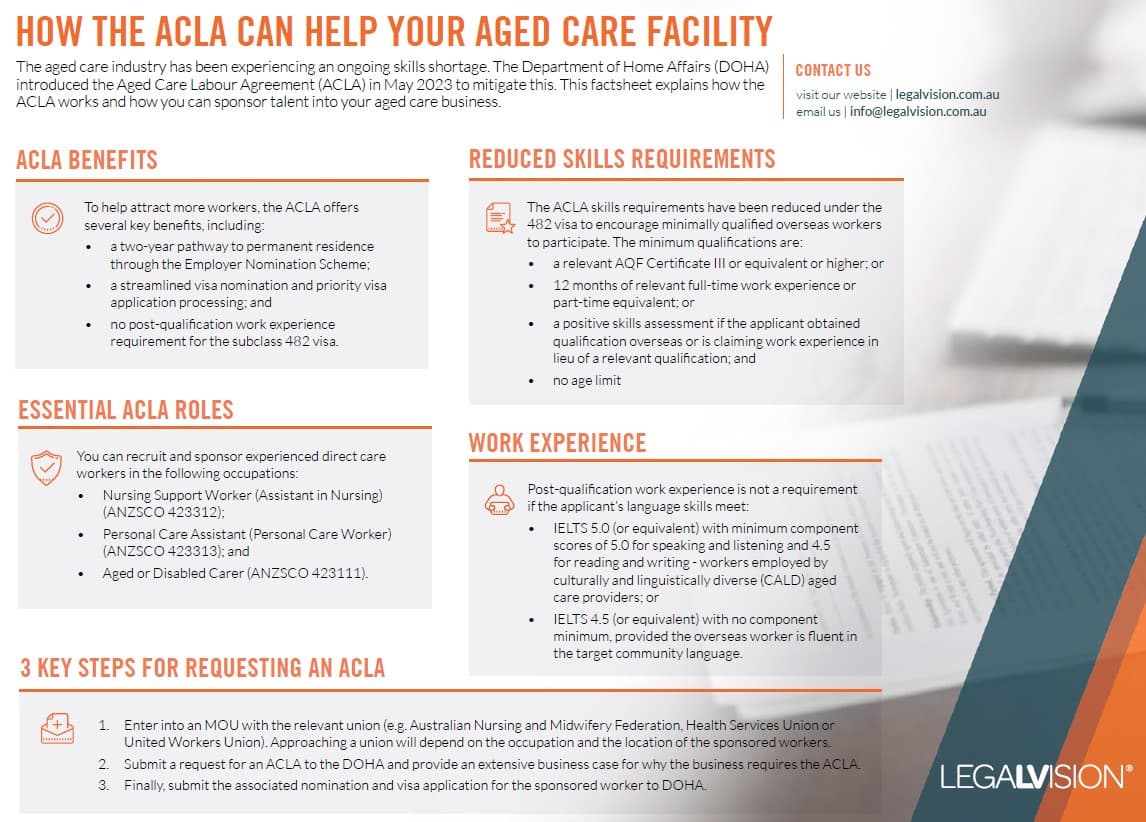As a business employing migrant workers, you must be aware of the recent developments affecting migrant worker employment. The Migration Amendment (Strengthening Employer Compliance) Bill 2023, which passed its second reading before the Senate on 12 September 2023, will amend the Migration Act 1958. It aims to address migrant worker exploitation and strengthen employer compliance. This article explores the changes to the law, the implications they have for employers and how you, as an employer, can ensure your business remains compliant.
What Are the Amendments?
To tackle issues regarding migrant worker exploitation, the bill will:
- make it a criminal offence for employers to unduly coerce or pressure temporary migrant workers to work in breach of their visa conditions;
- prohibit employers from engaging temporary migrant workers if they have previously engaged in migrant worker exploitation;
- increase the maximum civil and criminal penalties;
- expand Australian Border Force (ABF) officials’ powers in issuing enforceable undertakings and compliance notices to employers suspected of engaging in migrant worker exploitation; and
- encourage migrant workers to report instances of migrant worker exploitation by their employers, such as working in breach of their visa or visa cancellation, without fear of legal ramifications.
The Albanese Government announced its intention to address migrant worker exploitation on 5 June 2023. After extensive consultations with unions, businesses, and relevant stakeholders, it uncovered a systematic and repeated pattern of migrant worker exploitation across all industries. Findings revealed that one in six recent migrants to Australia is paid less than the minimum wage. This exploitation does not only hurt the individual worker. Ultimately, it effectively drives down wages and worsens conditions for all Australian workers.
Migration Amendment (Protecting Migrant Workers) Bill 2021
The issue of migrant worker exploitation and strengthening employer compliance is not new. The Migration Amendment (Protecting Migrant Workers) Bill 2021 was first introduced on 24 November 2021. Unfortunately, the bill lapsed and was not formally implemented.
Continue reading this article below the formCall 1300 544 755 for urgent assistance.
Otherwise, complete this form, and we will contact you within one business day.
Migrant Workers’ Taskforce
In 2016, the Migrant Workers’ Taskforce (MWT) was established to identify proposed reforms to address migrant worker exploitation. The MWT released its report on 7 March 2019 and identified several factors that contribute to migrant worker exploitation:
- limited English language skills;
- lack of knowledge of workplace laws and standards;
- fear of visa cancellation;
- willingness to accept below award wages;
- the remoteness of some working locations;
- business models that rely heavily on labour-hire companies; and
- franchise models that make it difficult for franchisees to run a profit without underpaying wages.
The MWT found that temporary migrant workers, especially those on visas tied to their employers, such as the Temporary Skill Shortage (subclass 482) visa, are highly susceptible to exploitation. This vulnerability is heightened when these migrants seek permanent residence through employer sponsorship.
Likewise, working holiday makers and international students hold visas with employment restrictions. Consequently, this increases their vulnerability, as they may fear reporting workplace exploitation or underpayment due to the risk of visa cancellation. Additionally, those under the Pacific Australia Labour Mobility (PALM) scheme, often working in low-skilled sectors in remote areas, are at a heightened risk of exploitation.
Recent Developments
The Australian Government has undertaken the following in their commitment to addressing the issue of migrant workers’ exploitation:
- raised and discussed the issue and their proposed reforms extensively at the Jobs Skills Summit in September 2022;
- enacted the Fair Work Legislation Amendment (Protecting Worker Entitlements) Act 2023 in the protection of migrant workers and their entitlement to workplace protections under the Fair Work Act 2009; and
- dedicated a $50 million budget to support ABF officials in the enforcement and compliance against migrant workers’ exploitation.
Implications for Employers
The Migration Amendment (Strengthening Employer Compliance) Bill 2023 is poised to have a significant impact on Australian employers, particularly those who employ temporary migrant workers. The bill aims to bolster compliance measures. It does so by placing greater responsibility on employers to ensure they adhere to visa conditions and employment regulations. This will likely result in increased scrutiny and oversight of hiring practices, with a focus on preventing the exploitation of temporary migrant workers. Employers will need to demonstrate strict adherence to visa requirements, such as fair wages and appropriate working conditions, to avoid potential penalties and legal consequences.
Furthermore, the bill is expected to introduce more stringent penalties for non-compliance with visa conditions, acting as a deterrent for employers engaging in exploitative practices. Australian businesses relying on temporary migrant labour may need to invest in robust internal systems and processes to ensure compliance with the new regulations. This could involve:
- comprehensive record-keeping;
- regular audits; and
- proactive measures to address any potential issues promptly.
How Employers Can Remain Compliant?
By law, employers, executives and directors are responsible for monitoring their sponsored or migrant workers’ legal right to work in Australia. Essentially, this means they must ensure workers comply with their visa conditions. This is an ongoing legal obligation, which employers must undertake both at the time of onboarding the employee and regularly during the course of their employment.
Therefore, employers should continuously monitor the following:
- visa status;
- passport status;
- work rights;
- personal details such as name and address;
- education course information (for student visa holders); and
- relationship status (for secondary applicants).
Employers found to have any employees or contractors working in breach of their obligations can receive hefty fines of up to $123,000 for each offence. Directors and executives can also be held personally liable. In addition, non-compliance can also cause reputational damage to the business.
At the moment, most businesses are currently either:
- outsourcing compliance checks;
- conducting the checks manually themselves (via the Department of Home Affairs website); or
- not complying with their obligations.
With the increased penalties for employers, you should consider engaging legal assistance to ensure your business is compliant.

This factsheet explains how the ACLA works and how you can sponsor talent into your aged care business.
Key Takeaways
Recent legal developments to tackle employers exploiting migrant workers now compel employers to ensure their business fully complies with the law. Failure to do so can result in hefty fines of up to $123,000 per offence. As such, you must take proactive steps to mitigate the risk of non-compliance. This involves stringent record-keeping and conducting regular audits of migrant employee information and status. Furthermore, if you find any issues of non-compliance, you should rectify these immediately.
If you need help complying with your obligations when employing migrant workers, our experienced immigration lawyers can assist as part of our LegalVision membership. For a low monthly fee, you will have unlimited access to lawyers to answer your questions and draft and review your documents. Call us today on 1300 544 755 or visit our membership page.
We appreciate your feedback – your submission has been successfully received.












